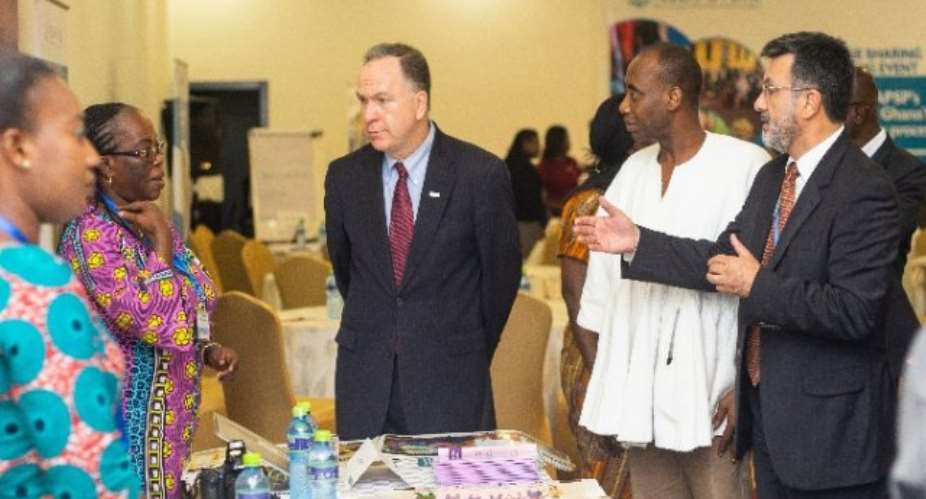The Ministry of Agriculture says it would soon ban some suppliers of seeds under the ‘Planting for Food and Jobs’ programme.
According to the Ministry, it has observed in recent times that some of these suppliers are providing farmers with grains instead of seeds – a situation it believes is shortchanging the agricultural sector.
A Deputy Agric Minister, Dr Sagre Bambangi says the development has gone a long way to affect the number of yields.
“In our Planting for Food and Jobs programme, some suppliers supply grains and label it as seeds so we are signaling to these suppliers that such suppliers would be blacklisted with the Ministry because it’s totally unacceptable.
"It deprives farmers of the potential yields that they could’ve gotten and it also makes them more apprehensive towards the adoption of new seeds that could improve their productivity…as humans as all of them are some of them would tend to abuse the system and that does not help our farming,” he said.
Meanwhile, he says government’s ‘Planting for Food and Jobs’ (PFJ) initiative targets 50,000 farmers across the country.
Dr. Bambangi spoke to JoyBusiness at the final event of a 5-year USAID/Ghana project named; Feed the Future (FtF) Agriculture Policy Support Project (APSP) on Knowledge Sharing and Learning Forum organised here in Accra.
FtF ASPS
Since December 2013, when USAID contracted Chemonics International to implement the Feed the Future (FtF) Ghana Agriculture Policy Support Project (APSP), the project team has contributed their experience, knowledge, and dedication to the growth of the agricultural sector of Ghana.
According to the USAID, while Ghana has experienced much needed growth and development in the agriculture sector, the government has many opportunities to address remaining challenges to unlock its full economic potential.
To address the challenges above, USAID launched the five-year Feed the Future
Agriculture Policy Support Project (APSP) in 2013 to increase the capacity of the Ghanaian government, the private sector, and civil society organizations (CSOs)to implement evidence-based policy formation, implementation, research, and advocacy and to perform rigorous monitoring and evaluation of agricultural programs implemented for the METASIP.
Achievements
APSP assisted the Ministry of Food and Agriculture with a holistic policy reform process to enhance the legal and technical frameworks that regulate and guide the seed industry.
The primary APSP-supported policy instruments included redrafting the Seed Regulations to harmonize its content with Economic Community of West African States (ECOWAS) protocols, revising the Seed Variety Evaluation and Release Manual and the Accreditation Manual for Seed Certification.
It also includes developing crop variety licensing policies and seed commercialization agreements for the National Agriculture Research Institutions (NARIs) and developing the templates of licensing contracts to produce foundation seed.
Finally, APSP trained the Agric Agriculture’s Directorate of Crop Services and the Plants Protection and Regulatory Services Directorate staff to use and implement these procedures.
The project also contributed to increased awareness and knowledge on key seed-related policy instruments and worked with the public and private sector to increase the availability of high-quality seeds to improve farmers’ productivity and income.





 Election 2024: Don’t be complacent, we haven’t won yet – Asiedu Nketia cautions ...
Election 2024: Don’t be complacent, we haven’t won yet – Asiedu Nketia cautions ...
 Election 2024: Stop fighting over positions in Mahama’s next govt – Asiedu Nketi...
Election 2024: Stop fighting over positions in Mahama’s next govt – Asiedu Nketi...
 Prof Jane Naana Opoku-Agyemang will restore dignity of vice presidency – Fifi Kw...
Prof Jane Naana Opoku-Agyemang will restore dignity of vice presidency – Fifi Kw...
 'Ghana beyond aid' has turned out to be 'Ghana without compass' – Naana Opoku-Ag...
'Ghana beyond aid' has turned out to be 'Ghana without compass' – Naana Opoku-Ag...
 Nation builder Mahama will deliver on his promise of a 24-hour economy for the b...
Nation builder Mahama will deliver on his promise of a 24-hour economy for the b...
 Prof Jane Naana is more than qualified to be Ghana’s first vice president and ev...
Prof Jane Naana is more than qualified to be Ghana’s first vice president and ev...
 WENDA petitions Akufo-Addo, Speaker of Parliament to make vote-buying illegal
WENDA petitions Akufo-Addo, Speaker of Parliament to make vote-buying illegal
 Supreme court declares payment of wages to spouses of President, Vice President ...
Supreme court declares payment of wages to spouses of President, Vice President ...
 Publish full KPMG report on SML-GRA contract – Bright Simons to Akufo-Addo
Publish full KPMG report on SML-GRA contract – Bright Simons to Akufo-Addo
 Kumasi International Airport to begin full operations by end of June
Kumasi International Airport to begin full operations by end of June
